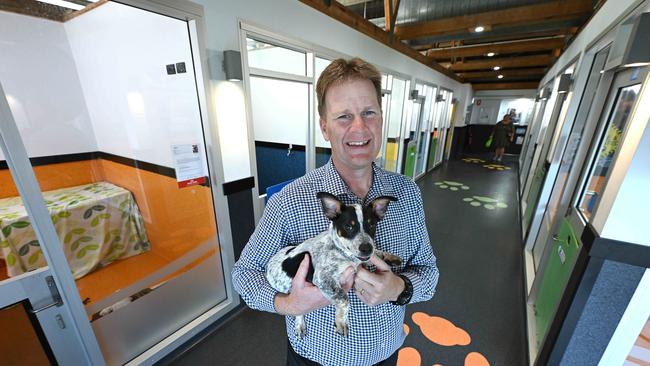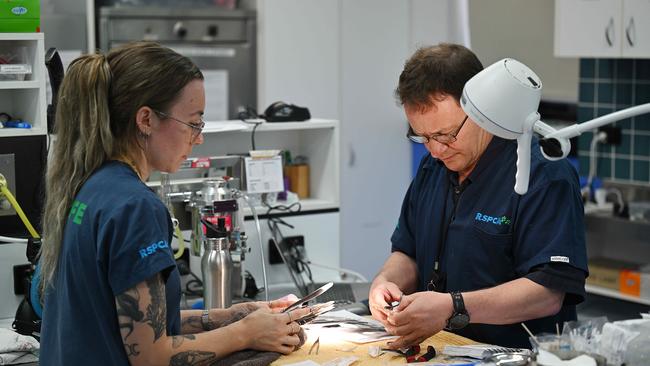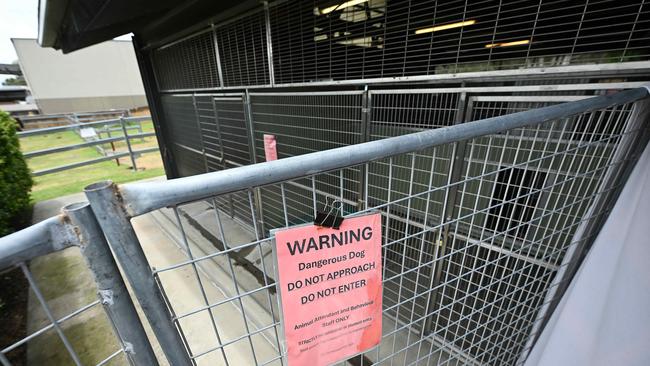RSPCA Qld’s Darren Maier talks about radical new direction as CEO hands over reins
RSPCA Queensland will be taken in a radical new direction, as its besieged outgoing boss Darren Maier insists it never lost its focus on animals during his five turbulent years at the helm.
Pets and Wildlife
Don't miss out on the headlines from Pets and Wildlife. Followed categories will be added to My News.
RSPCA Queensland is on track to head in a radical new direction, sparked by how Covid-19 “humanised’’ pets, as its outgoing boss Darren Maier prepares to hand over the reins after five turbulent years at the helm.
Mr Maier said he was proud to have left the charity in better financial shape than ever, including being debt-free for the first time in 20 years, with 65 new staff, a 40 per cent surge in bequests and huge jump in volunteers.
It was now also just $5m short of the $25m it needed to move wildlife rehabilitation to a state-of-the-art new facility in the Redlands, which he said would transform the RSPCA when it opened in 2026.
The headquarters at Wacol in Brisbane’s west would then become focused entirely on domestic animals.
Mr Maier, a former chief operating officer at vet franchise Greencross, announced in October that he would step down after five years as CEO.
He starts a new role in “human health’’ in January, with advertising well under way for a new CEO.
During his tenure, the RSPCA was rocked by controversies including hefty executive bonuses, a whistleblower probe into conflict of interest allegations and complaints from staff that the organisation had lost its way in protecting animals.
It culminated in court action, later dropped, and a call in November, 2021 by former Premier Annastacia Palaszczuk for a “thorough review” into RSPCA Queensland.
The controversy has died down in the past two years, although earlier this month the RSPCA revealed it was paying back $2.8m to more than 1100 former and current staff after discovering they had been underpaid for six years.
It recently also announced a streamlining of its 1300 ANIMAL hotline, with night-time calls to be farmed out to other organisations so it could concentrate on day-time requests for help.
AI and other technology was now being used to handle calls after a 30 per cent jump this year.

The absence of bad headlines possibly contributed to a huge increase in volunteers this year, to 3689, after numbers flatlined in the previous three years.
Mr Maier would not be drawn on that period but said the charity had “never lost its focus on animals’’.
“Change is always difficult but organisations need to change to continue to be effective and be able to continue to deliver their outcomes,’’ he said.
“We take our donors’ funding really, really seriously, making sure we invest it wisely and maximise the outcome that we can get out of that money.
“The changes we have made will drive a better outcome for animals in Queensland, there’s no doubt about it.
“So I’m really proud of the work we’ve done. But it’s not about me, it’s about our teams that have come on the journey.’’
The 2024 annual general meeting this Friday, November 29, will be told RSPCA Queensland’s finances had stabilised with funds now totalling about $63 million, helped by the surge in bequests and higher overall donations.

The number of bequests jumped from an average of about 135 to 180 last year, while donors helped raise $40,580,000.
The fleet of rescue vehicles had been upgraded and there were now 22 RSPCA op shops, up from 14.
The shops had boosted awareness of their work and resulted in 600 animal adoptions.
“We’ve also been able to reduce the average length of stays from 30 days to about 23 to 24 days, of late,’’ Mr Meier said.
A new whelping facility and a dangerous dog section to reduce the safety risk to staff were some other key achievements in his term.
But Mr Meier said wildlife rehabilitation costs had soared from about $3 million to more than $4.5 million, partly because of higher vet wages, new facilities and higher costs.
During his term he had refocused the RSPCA into a “community facing’’ organisation, with the aim of supporting pet owners so fewer animals were brought into Wacol.
“It costs us about $1000 a year per animal to care for them so we want to reduce the number coming in as much as possible,’’ he said.
The focus on outreach included community days, events in indigenous towns such as Cherbourg and driving the cut-price desexing program offered each year through vet clinics.
There was now also a much bigger effort to treat behavioural problems in pets, which stemmed from changes during Covid-19.
“The biggest change we have seen is the humanisation of pets during Covid,’’ he said.
“People were always around at home, but their pets didn’t get to go to the dog park and socialise.
“We’ve also seen a lot fewer strays because of Facebook community pages. When an animal goes missing, someone always knows someone who has found them.
“We’re now trying to better educate the public and focus on these behavioural issues. It’s the biggest pivot for our organisation in years.
“Ignorance and financial challenges, which have been worse because of the affordability (crisis), are things we are trying to tackle with our education programs and things like handing out 2000 bags of free food.
“If that can help keep a pet with their owner, instead of them being dropped in here, everyone is better off.’’

He said the new Redland wildlife centre would allow a much greater focus on caring for native animals.
For the first time since the RSPCA moved from Fairfield to Wacol in 2012, after the previous year’s floods destroyed its headquarters, animals would be able to be housed outdoors.
At the moment they were in a crowded indoor facility because of the noise of barking dogs.
“During the 2019 bushfires and drought we treated more than 1000 koalas,’’ he said.
This year, that even included a staffer giving mouth to mouth resuscitation to a koala.
The five full-time and four part-time wildlife vets treated 2700 animals on two tiny operating tables this year alone, performing all kinds of surgeries including feather transplants.
“We will have a much bigger, purpose-built facility and for the first time vets will be able to release animals they have treated back into the wild,’’ he said.
“At the moment they can’t, they just move on to the next animal, and that will be a wonderful thing for them to be able to do.’’





